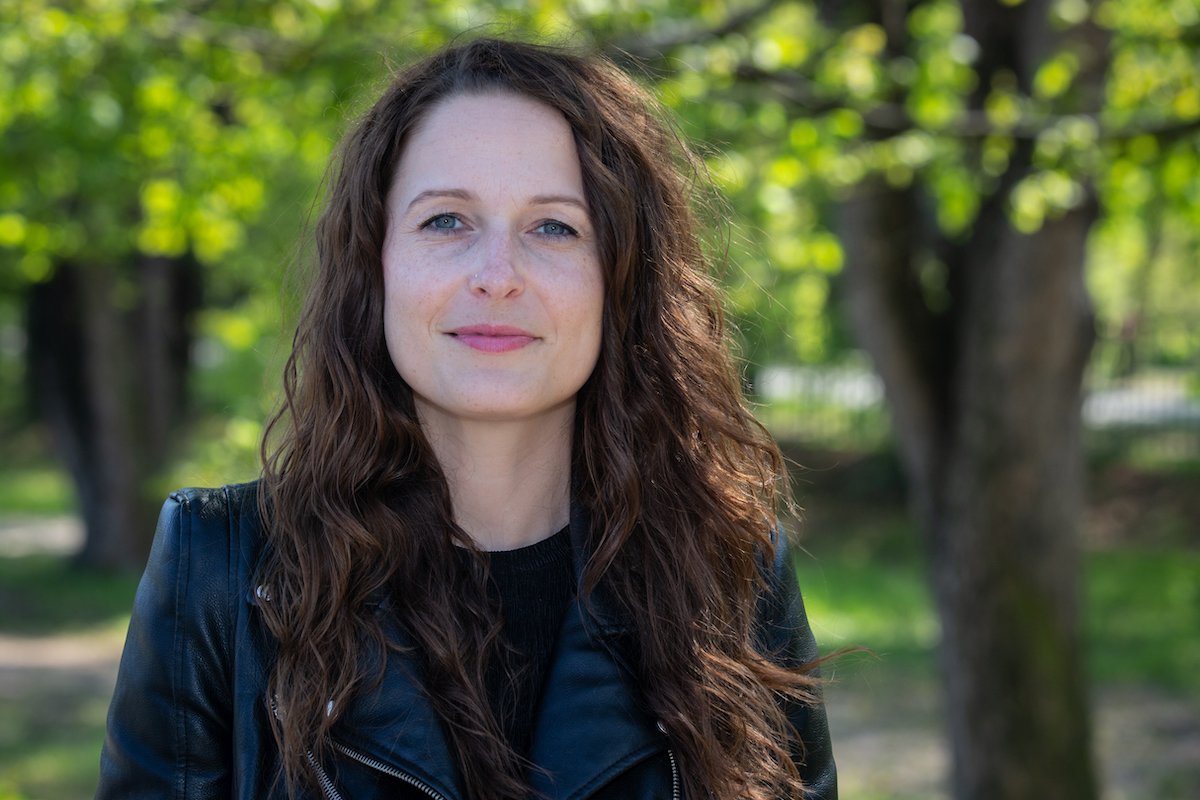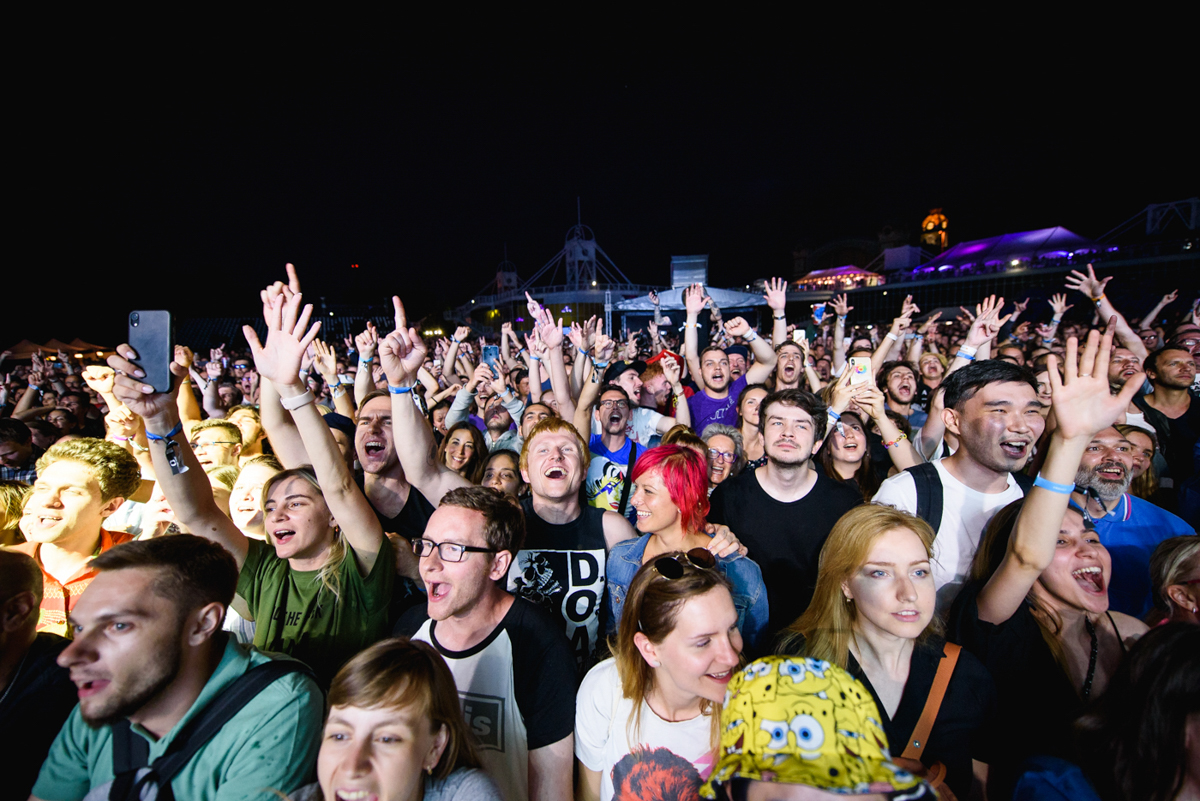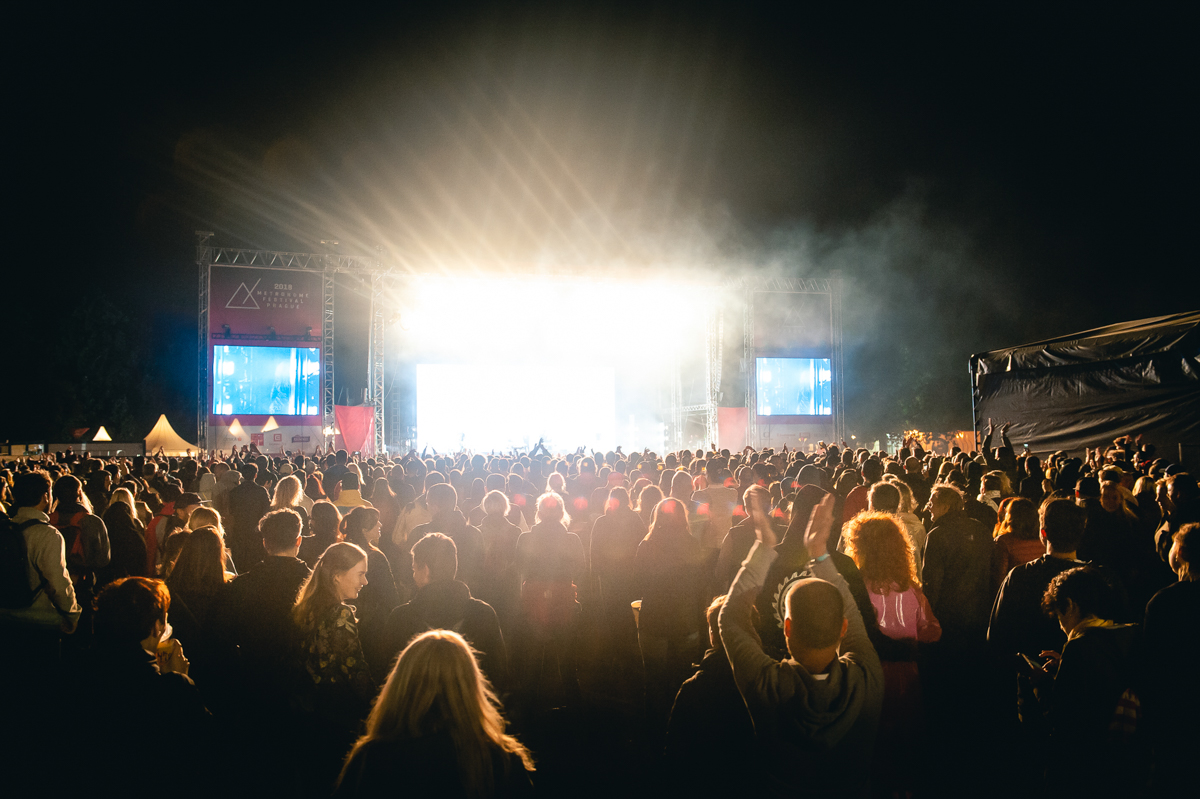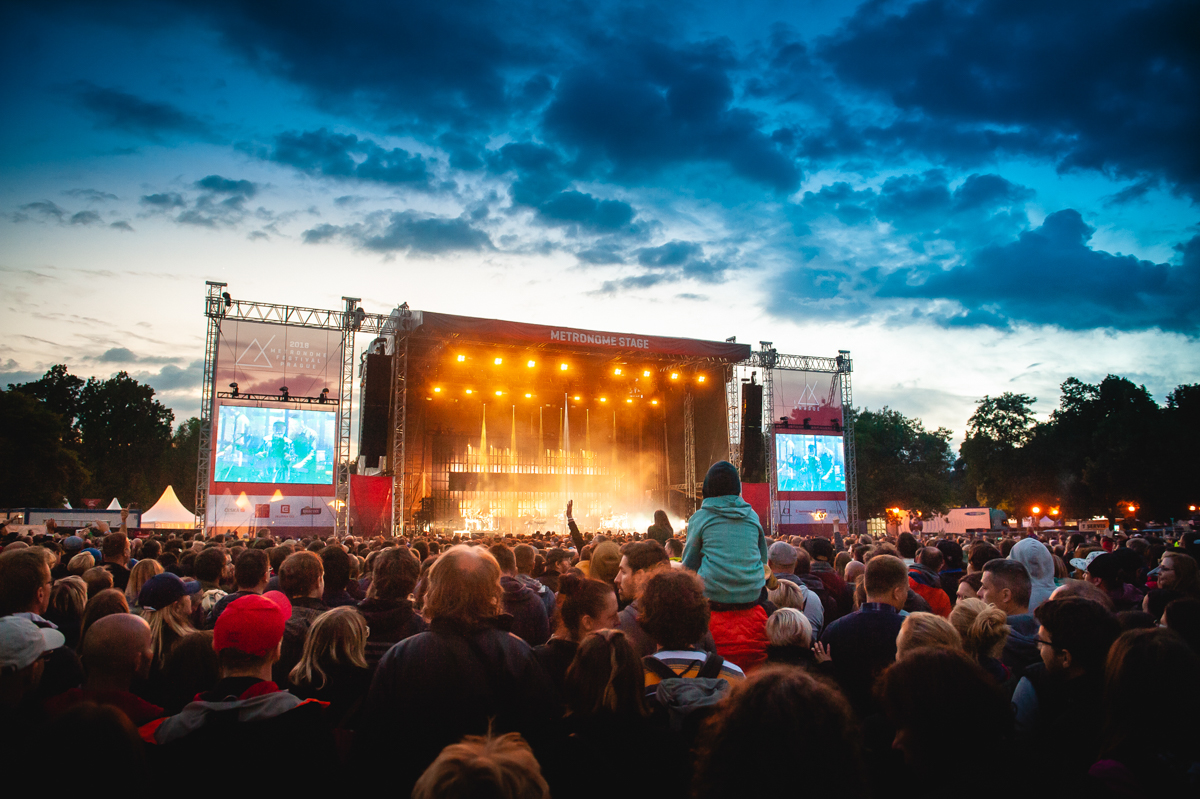In these times, publishing an interview, which was conducted months ago, (you know, that time, when Brexit and new Netflix series still were the most interesting topics, and Corona wasn't really a thing in Europe yet) feels a little wrong. Nonetheless: This talk with Barbora Šubrtová, Head of Program of Metronome Festival in Prague, is way too interesting, to just let it slide.
text Isabel Roudsarabi
editor Robin Hartmann
photos Peter Fulop, Čestmír Jíra, Lukáš Bíba, Adam Kořínek
reading time 12 minutes
Admittedly, the first impression of Metronome, watching Aftermovies and looking at the Website, is not too impressive. It feels like a pretty standard Event - a couple big stages, a couple big names, a little too less DIY - not really different from other major festivals.
But when speaking to Barbora, all these thoughts fade away in seconds. She is putting so much love and passion in her work, has so many stories to tell, you could spend an entire evening just listening to her talking about her job and exciting you with her enthusiasm.
We were lucky to be able to meet her at this years ESNS and let her tell us about why comfort is a staple at the festival, which bookings of hers she was the happiest about and why it is definitely worth considering a city trip to Prague and visit Metronome.
Hey Barbora, thanks for taking the time! Can you start by telling a little about yourself and your work at the festival? How did you come to work for Metronome?
I am currently Head of the Program and a Booker at Metronome. I have actually been working for the Festival from year one of its existence. I have been working with the Festival founders a little longer, though, because we have another festival in place, with a focus on emerging artists. You could say I just like music quite a bit *laughs*.
Prior to getting into all of the festival-related work, I was employed in music event promotion and production. So I think I know the business from every angle possible. For the first time this year, besides my main involvement in the program and booking, I will also be in charge of some extra activities at the festival site, including light design. I am very much looking forward to that.
Is it the first time that there will be a big side-program at Metronome?
We already did it last year, but it's still new to us. We are trying to juggle ideas back and forth.
It's not that easy to incorporate non-music related topics into the festivalsphere.
I'd say that last year was a "Year Zero" for me in this field, and really this year we're beginning to have designated plans for installations and connecting visual art with the music on site. I think it's going to be a big step forward for us and the visitors attending the venue this year.
You mentioned that you're currently involved with another festival as well. Can you talk a little about that?
It's called United Islands of Prague. It's a free-admissions festival and we're only focusing on presenting emerging artists from the Czech Republic as well as some international acts. This is going to be our 15th year already, so we're very well established by now, with a great attendance of over 50.000 people every year. Our visitors come to see the festival with open minds; they are just curious about some new music they've never heard before. I think it's really cool that we are given this chance to introduce young artists to a broad audience, and those who become successful will most likely play at Metronome Festival at some point in their career.
Which newcomer should be on everyones watchlist right now?
I would love to mention Flohio. She's a female MC, rapper and singer, she's really talented and shows great charisma on stage. She is actually gonna play at Metronome just after Skeptas performance this year, so I am pretty sure that night's gonna be great, especially for fans of the genre. Another one would be – out of maybe 40 bands I want to see here in Groningen – Still Corners, because I do, after all, enjoy electronic music and Indie. They're a great addition to our line-up with their soft, dreamy touch to Folktronica.
Regarding Eurosonic Noorderslag, where we are right now, I am very excited about Celeste. She's the soul singer everybody is talking about right now, so we'll see whether she might become an addition to Metronome's 2020 line-up.
Do you have a favourite track that's on your playlist right now?
Yeah, that would be "Dreams" by Beck.
Because this year my dreams are coming true, seeing him back in the Czech Republic for the first time in 25 years. I still can't really believe it.
We've been trying to book him for many years now and so have other promoters. This is a really big deal for all of us, I think.
Would you consider him your favourite booking of the past five years?
I guess so, yes. Mostly because of the time it took... the whole process was really, really difficult. But besides him, my second favourite booking we've had are probably The Chemical Brothers. Wow *laughs*.
They were also quite difficult to achieve, but they always offer this amazing live show besides being one of my favourite artists ever. I was really glad I got to share this experience with all of the happy people in the audience.
While working at the festival, do you actually have some spare time to check out some bands or are you mostly running back and forth, unable to take a break?
I'd love to have more time, but unfortunately I am busy most of the day. Usually, however, during the headliner sets, I am taking time to watch the first half and have a quiet moment for myself on site. Yet, once the band is finished or close to finishing their set, it's getting very busy again. So I do envy the visitors sometimes.
But standing in the backstage area and seeing the crowd through the eyes of the band is also and unforgettable experience.
That's something that makes up for the time I cannot be part of the crowd and see shows myself.
Do you like to visit other festivals then, where you can have this other experience?
Yes, definitely. I love doing that because for once I can actually move freely and listen to the acts I want to see, and I don't have do consider being called off to get involved with some emergency. Actually, my personal favourite is Pohoda Festival because our line-ups are pretty similar, genre-wise, and the general attitude towards music is the same. Sometimes I can even go there and see a band I wasn't able to catch at our own festival. Plus, their views on politics and the environment are very close to what I identify with. We are friends with their team, so it's a great opportunity to travel there and enjoy a festival from a different, more relaxed perspective.
I was told that you guys at Metronome have an extensive focus on visitor comfort, too.
Yeah, that belief originates from our experiences at other events and festivals. We felt tired of endlessly waiting in line for transport to the site or a clean toilet. Sometimes even finding a place to sit when you want to eat your food can be difficult. We think these kind of things should be a basic necessity and available for everybody all the time, not only for the ones who are fortunate enough to have VIP or backstage passes. We wanted to provide this upper standard experience for everyone, because it is already exhausting enough to spend your weekend at a festival site. It can be very tiring. These little steps we are taking are not at all too difficult to provide, yet they can rapidly enhance your experience. I think as an audience you can then enter the music you're exposed to from another point of view, because you're free from exhausting yourself.
A huge part of our audience is between 25 - 35 years old, so they're not really youngsters who might not care too much any more. They might have kids already and are used to a different standard of convenience. We wanted to provide solutions for these people, too, and also let other guest know that attending Metronome does not mean having to cope with mud and dirt everywhere all the time. I believe this should go hand in hand with taking care of the environment. We have, for example, gotten rid of all single-use plastics. Our plates, cutlery, bottle caps etc. are made of composting materials, and this does not only apply to the audience area, we are also using these backstage for bands and co-workers.
We don't really use any plastic at our festival site any more.
The only thing we still have to accept right now is small plastic bottles on stage, but even there I managed to convince some acts to accept bottles from local brands which are made of recycled plastic. Even though it is not the kind of water they are asking for, most of the bands are actually thrilled we are thinking ahead this way. They are supportive and don't complain about the circumstances.
I think sustainability is an issue we all have to consider very carefully in the next few years. This includes all the travelling connected to the festival business: for example we would like to try to give the opportunity to our visitors to plan and support activities helping to reduce the carbon footprint. The transport of people and equipment involved in organising a festival is really bothering me quite a bit. In the upcoming few years we are definitely dedicated to support change and new solutions in this field. I think there is no alternative to doing so.
Do you think that festivals, as a cultural event of a certain size, have a role model function towards both the bands and the audience?
Yes, definitely. I hope this feeling continues to become a general value in a few years at most or all festivals in the scene. Even some artists now take a stand and talk about these things publicly and more urgently than we have experienced before.
You mentioned Metronomes new additional program already - in what ways do you think did the festival change since you got started?
Comparing the venue from back then to today, it's just amazing to see how much us working together with the city has paid off. Of course we don't own the location, we rent it for a certain amount of time every year and the way we were able to make use of the space has adjusted a lot over the years. We have created new facilities, we were able to cultivate the greens in the area so they don't get destroyed, new roads and transport ways were built. For us, the ones who have been involved with the festival from day one, that's a huge success.
I would also say that all of this evolved alongside the line-up. In the beginning we had - for the lack of a better word - more "classic" acts; like Iggy Pop or Sting. But we recognised the extremely fast development in music nowadays and adapted accordingly. In the first two years, for example, we didn't showcase any modern pop acts; literally none. And now one of our headliners in a Grime artist. So we are evolving together with the music and the people in the audience. We're closely observing the changes in pop culture, and I'd say that the venue and the line-up reflect that and have seen the most progressive changes over the years.
One of our slower developments, our "slow steps", is trying to open up for an international audience. That may be something not as visible, but there's still a lot of work involved behind the scenes. We started as a festival in Prague designed for a mostly Czech audience, but over the years we realised that, with this beautiful city around the corner, we need to appeal to visitors from other European countries as well. We're trying to do so through a very selective booking process. Prague is very much located at the centre of mainland Europe, so why not invite everyone to gather here once a year? It's a very accessible area, by both plane and train, or even by car, so the next big step for us, logically, has to be to open up to the international scene.
I feel like there has been a visible development in the entire festival market. People don't only decide to visit festivals next door any more, they want to travel and research new experiences. Some might even see it as some kind of 'vacation+'.
Yeah, I see that, too. It's two sides of the story, I think. On the one hand, the Czech audience has endless choices of where to go to all over Europe. Of course, depending on which country you choose, it might be a little more or less expensive, but generally we are experiencing that they are willing to pay more to get more. So that forces us to provide the best experience possible in order to be able to compete with other international festivals that have been distracting these visitors away from us in the past because we could not provide what the were looking for.
I think the competition is able to raise the standards for festivals across Europe.
Can you tell us more about accessibility standards at your festival?
I believe we are one of the friendliest festivals in terms of accessibility in the Czech Republic. We have the advantage to be located in the city centre, so it's easy to take an underground train to the festival site. The stop is only 200m away from the entrance, and our festival grounds are generally kept flat so there's no obstacles for you in case you're attending in a wheel chair. We are also providing a restricted area in front of each stage designed to give the disabled the opportunity to have a good view and enjoy the shows.
As passionate as you are, can you think of a specific moment or event that made you become so enthusiastic about your work and the festival scene in general?
Yeah, I can think of a good one. I was into music from my teenage years onwards, but back then I didn't even make the connection to a possible working environment for my future. I didn't think something like what I am doing now could a job.
Music was a passion, of course, but I could not see myself making a living out of this passion alone.
Yet, when I went to university later on, I started to visit quite a lot of live shows and performances – as you do when you are trying to enjoy yourself – and it just so happened that I became a DJ. I just loved the electronic music scene so much that I gave it a try. I was DJ-ing very intensely for several years, maybe 3-4 times a week, and at that time I also started to volunteer in an NGO which was organising festival. I quickly became very involved and started working as a production manager, because I realised that I loved organising and networking, especially when joined with my passion for music. After two years of doing that, I got an offer from United Islands of Prague, and as far as this story goes I just got stuck in the industry – in a positive way *laughs*.
Even though I have been working in music for a good while now, it still gives me endless joy to attend shows and discover new talents etc. This kind of work never fails to give me goosebumps on a regular basis. As soon as this feeling I have about my work disappears eventually, it will be my time to take a break. However, it has lasted for about 10-15 years now and I cannot see it stopping anytime soon.
Can you remember having a favourite moment in the history of Metronome Festival?
Definitely seeing Massive Attack. They played "Unfinished Sympathy" as their last encore. I have talked to many people who attended that show, all huge Massive Attack fans, and they have all told me that it was one of the bands best shows. When I heard them play that song, I had a flashback to me discovering it when I was 15; at a time when I could never have imagined to be in this very specific moment. It was truly special.
Is there anything else you really want people to know about your festival?
What I want the readers to know is that we're located in a very nice area within the city of Prague: in the centre of the city on a former recreational park area. About half of the venue is solid grounds and the other half is located in the adjacent greens with trees and grassy plains where you can lie down and recharge for a bit.
We have three open-air stages at which set times are never clashing, so you will be able to see all your favourite acts and you don't have to compromise. We also have two indoor stages where you can attend club parties well into the early morning hours.
Our audience is very easy-going and friendly. While some of them might not speak English, that's generally not a problem. They are still generous people *laughs*.
You will attend Metronome and you will feel welcome and happy. We really try to focus on making you feel like you belong, no matter which area or country you might be attending our festival from. However, I think the main reason why that this concept is working so well is because our visitors are very compassionate. You likely won't experience pushing around in crowds.
Our venue would effectively be able to host twice the amount of people we are currently letting in. We want you to be able to get absorbed by the show and not to worry about strangers involuntarily jumping your back *laughs*.
I think it will most likely surprise you how comfortable of an experience it can be to attend a festival of our size. It doesn't have to be stressful and overcrowded.
At Metronome you can always take a moment and take a breath to make the most of your experience.








